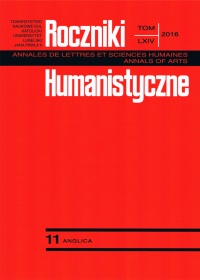Speech, writing and the body in Gabriel Josipovici’s Hotel Andromeda
Abstrakt
Mowa, pismo i ciało w powieści Gabriela Josipovici Hotel Andromeda
Celem artykułu jest analiza dialogowego stylu pisarstwa Gabriela Josipovici w jego najnowszej powieści Hotel Andromeda (2014), w celu udowodnienia, że użycie formy dialogowej ma za zadanie ujawnienie istotnych kwestii teoretycznych, takich jak relacja między mową, pismem i ciałem. Interesującym aspektem powieści Josipovici jest fakt, iż mowa i pismo (fragmenty pamiętnika) zostały wprowadzone do tekstu w sposób identyczny, implikując w ten sposób, wbrew wielowiekowej tradycji zapoczątkowanej przez Platona, równorzędność obu środków wyrazu. Wspólnym mianownikiem dla mowy i pisma w utworze Josipovici zdaje się być ciało, przemycane do literatury za pomocą dialogu oraz głębokiej fascynacji fizycznością pisanego słowa wśród bohaterów powieści.
Bibliografia
Alsknin, Adrianna. “W poszukiwaniu symbolicznej sygnatury. Writing cure: ciało, pismo, afekt.” In Kultura afektu – afekty w kulturze. Eds. Ryszrd Nycz, Anna Łebkowska and Agnieszka Dauksza. Warszawa: Instytut Badań Literackich PAN, 2015. 78–98. Print.
Barthes, Roland. Image Music Text. London: Fontana Press, 1977. Print.
Best, Victoria. “The Mind of the Modern: An Interview with Gabriel Josipovici.” NC Magazine 6.12 (2015), www.numerocinqmagazine.com. Accessed 28th August 2016.
Blondell, Ruby. The Play of Character in Plato’s Dialogues. Cambridge: Cambridge University Press, 2002. Print.
Bradley, Arthur. Derrida’s Of Grammatology. Edinburgh: Edinburgh University Press, 2008. Print.
Cuddon J. A. The Penguin Dictionary of Literary Terms and Literary History. London: Penguin Books, 1991. Print.
Fludernik, Monika. Echoes and Mirrorings: Gabriel Josipovici's Creative Oeuvre. Frankfurt: Peter Lang, 2000. Print.
Fludernik, Monika. “Introduction.” www.gabrieljosipovici.org/intro.shtml. Accessed 28th August 2016.
Frede, Michael. “Plato’s Arguments and the Dialogue Form.” In Oxford Studies in Ancient Philosophy. Ed. by James C. Klagge and Nicholac D. Smith. Oxford: Oxford University Press, 1992. 201–220. Print.
Hyland, Drew A. “Why Plato Wrote Dialogues.” Philosophy & Rhetoric 1.1 (1968): 38–50.
Irwin, Jones. Derrida and the Writing of the Body. Farnham: Ashgate Publishing, 2010. Print.
Josipovici, Gabriel. Hotel Adromeda. Manchester: Carcanet, 2014. Print.
Touch. New Haven and London: Yale University Press, 1996. Print.
Writing and the Body. Princeton: Princeton University Press, 1982. Print.
Jourdain, Margaret. “A Conversation Between Ivy Compton-Burnett and Margaret Jourdain.” Turtle Point Press Magazine (2013), www.turtlepointpress.com. Accessed 28th August 2016.
Ong, Walter J. Orality and Literacy. London and New York: Routledge, 2002. Print.
Paiking, Henning. “From analytic dialogue to published text.” In Writing in Psychoanalysis. Ed. by Emma Piccioli, Pier Luigi Rossi and Antonio Alberto Seni. London: Karnac Books, 1996. 37–52. Print.
Rimmon-Kenan, Shlomith. Narrative Fiction: Contemporary Poetics. London and New York: Routledge, 1999. Print.
Rotstein, John. “Gabriel Josipovici Q&A re Infinity and other matters.” April 2012. www.gabrieljosipovici.org/interviewjrotstein.shtml. Accessed 28th August 2016.
Stawiarski, Marcin. “Interview with Gabriel Josipovici.” Lisa 12.2 (2014), https://lisa.revues.org. Accessed 28th August 2016.
Tidwell Campbell, Joanne. Politics and Aesthetics in the Diary of Virginia Woolf. New York: Routledge, 2008. Print.
Weldon, Fay. “Talk Before Sex and Talk After Sex.” Rev. of Deception by Philip Roth, March 11, 1990. New York Times, www.nytimes.com. Accessed 28th August 2016.
Zappen, James P. The Rebirth of Dialogue: Bakhtin, Socrates and the Rhetorical Tradition. Albany: State University of New York Press, 2004. Print.
Copyright (c) 2016 Roczniki Humanistyczne

Utwór dostępny jest na licencji Creative Commons Uznanie autorstwa – Użycie niekomercyjne – Bez utworów zależnych 4.0 Międzynarodowe.





